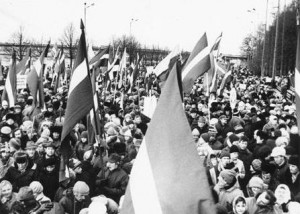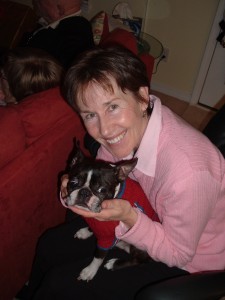May
10
Guest Post by Dace Mara Zacs

In response to my question, author and speaker Antanas Sileika asked for a show of hands for the last book anyone had read. The room at the WCYR lunch meeting at Aurora Cultural Centre was filled to capacity. We’d all come to hear the artistic director of the Humber School for Writers share writing tips.
“Why fiction and not memoir?” I had asked, referring to his recent historical novel, Underground.
“Fiction?” he said, looking around the room.
Virtually all hands went up.
“History?”
Only three of us raised our hands.
He nodded. It was the response he’d anticipated. And it was helpful in that it illustrated how, if a memoir reads too much like a history book, no one will want to read it. But it was not the answer to my question, exactly.
I’d just read Antanas’s novel, a “literary thriller” about the partisan resistance movement, and ill-fated love, set largely in post-war Lithuania. Praise for Underground points to its vivid narrative and avoidance of “details too obviously gleaned from dusty archives.” I found the story strikingly similar in theme to my own family’s experience in Latvia. Reading it gave me fresh inspiration — but it was fiction and my form was memoir. Since the events described in Antanas’s narrative were based on his own family history, I was curious: why had he not written it as memoir?
A history is meant to be a factual work, written devoid of subjectivity (allegedly) and with scholarly authority (hopefully). Memoir is also non-fiction, but with a personal point of view. And herein lies its interest: the facts interpreted subjectively give the reader a unique perspective, however dust-covered the subject.
I was in the midst of yet another revision of my father’s story set in the Second World War and post-war decades, and I was thinking, Finally … this rewrite is my last. Then I hit a wall. Something was still off.
Among Antanas’s presentation handouts was a 1996 letter from his first editor pressing for a rewrite, and then another, despite that the writer was already prize-winning and published. I felt somewhat heartened.

January 1991: National demonstration in Riga, Latvia, in support of Lithuania and freedom for the Baltics. (Credit: Archives of the Latvian War Museum)
My manuscript has been in process for close to eighteen years. In 1994, after my father died in Latvia while on holiday, I travelled there — my first time ever — to bury him according to wishes he’d made known to me before leaving Canada. In Latvia, I met relatives who opened my eyes to the “messy side” (Antanas’s words) of the Iron Curtain, the fate of the vanquished under the Red Terror, and in particular, the consequences of finding oneself on the “wrong side of the war.” The more I listened and recorded, the greater my grief and outrage. My father had never spoken of this.
His story, our family’s story, had fallen to me to tell.
Coming to the craft late in life, I began to write, unaware of the personal and political implications. I was, in the literal sense, a naive narrator. Despite reading how-to books on creative non-fiction that emphasized the quickest way to alienate a reader is for the writer to advocate for a cause, I amplified my “memoir” with voluminous research and historical fact to make my case — material that any reader would have skipped over, and that my editor advised me to reduce.
“Boring” is the word writers most fear to see in editorial comments on their work, said Antanas. All of us in the room chuckled, but inwardly I winced. Guilty as charged. And slow to learn. Last December, Wayson Choy had said much the same at a WCDR breakfast meeting in Ajax — “the reader wants the personal story, wants the writer risking herself” — and still I sent “revised” material along to my editor, who, once again, asked where was I in the story, what was my take on my parents’ experience, and gently probed, “Do you think you might be trying too hard to prove something?”
During the question-and-answer portion of his presentation, Antanas politely declined to dialogue with me about Underground in order to give others the opportunity to ask questions. Instead, afterwards, he generously stopped at our table.
I think it was my asking, “Don’t you feel passion for Lithuania’s national narrative?” that had him pull up a chair and sit down.
His reply was simply put, and self-evident it seems to me now, but nevertheless, that day it felt like an epiphany.
“It’s nationalistic,” he said.
In that moment, he encapsulated my writing journey of a decade and more. My memoir rewrites weren’t working because I’d not distinguished my perspective from that of my father’s and, more broadly, Latvia’s war generation.
My editor had been reiterating this in so many ways and steering me inwards, and intellectually the writer in me knew it, but the daughter in me clung to the desire to vindicate my father, to give him a voice. Antanas’s matter-of-fact reply felt like the last piece of a stubborn puzzle clicking into place. It hit home emotionally perhaps because I was hearing it from someone who shares my Baltic roots and a similar family story. Whatever the reason, Antanas’s timely reply revealed to me the elephant in the room.
I’ve yet to individuate as a writer.
As a daughter of the immigrant mosaic and as a Canadian writer, I’d not asked of myself, what responsibility do I have to my generation? Without my voice, the narration lacked honesty and power, and relevance: it would be a story without an audience.
When I shared with Antanas the gist of my memoir about my father, he reflected for a moment and then related an anecdote, a true story. A soldier who’d earned the German Iron Cross got stranded behind the front line. Separated from his unit, the soldier buried his Cross and donned an Allied uniform.
Antanas concluded with, “Now that’s a story!”

This was the second gem I took away. A good story is central to both fiction and memoir. Both forms are doorways to understanding the human condition, and, if the writer is courageous and true, they are ways to show that no single version of the truth exists.
As a matter of fact — or, more accurately, opinion — it’s said that even the form termed “fiction” is autobiographical in that it stems in part from the writer’s unconscious, where lies unresolved personal history.
In March, Antanas selected the story “What’s Left” by Deepam Wadds as first-place winner of the recent Whispered Words prose competition sponsored by the Writers’ Community of Durham Region. Deepam said her submission was based on a true story. She’d tried to write it in one form and another but when she settled on narrating it “through the eyes of the woman herself, it brought power and immediacy.” Her story was thirty-eight years in the making.
For me, rewriting and re-visioning my memoir over time has functioned as a life-review. In the process I’ve learned more about myself — the child in me, the interplay between my authentic self and my mask, how all of these are exposed in my writing — and my family history than any amount of outer research could deliver. Chance meetings and seemingly ordinary comments can have an extraordinary impact on one’s writing. I’m learning too, not to be discouraged by the length of time it takes to get my story right.



 DACE MARA ZACS worked in multicultural workplace training with the Toronto, Scarborough, and Durham boards of education, and was private tutor to families from Japan and Taiwan in Canada on business. A turning point — the death of her father in Latvia — began a season of searching her roots, making trips overseas, immersing herself in the Latvian language, and writing a memoir. Dace is a member of the writing group Life Writers Ink. She is currently finishing her first book, The Other Side of the Sun: A Daughter’s Search for the Heart of Latvia.
DACE MARA ZACS worked in multicultural workplace training with the Toronto, Scarborough, and Durham boards of education, and was private tutor to families from Japan and Taiwan in Canada on business. A turning point — the death of her father in Latvia — began a season of searching her roots, making trips overseas, immersing herself in the Latvian language, and writing a memoir. Dace is a member of the writing group Life Writers Ink. She is currently finishing her first book, The Other Side of the Sun: A Daughter’s Search for the Heart of Latvia.
Sometimes the right people come along when we most need them. Dace, your probing put you in front of the people who could help you sort out the answers. It’s a difficult thing to write memoir, as I’m finding out too.
Yes, Mary, and goes hand-in-hand with our personal growth and awakening, the joy and the pain of it. Thank you for your unwavering support.
Dace, a compelling essay on navigating tricky terrain. I guess we all have to ask ourselves: “Whose story are we telling?” If it’s mine, or yours, whether told as memoir or fiction, then it’s about my journey or your journey. Our parent’s journey is another story. I liked your essay very much.
Thank you, Ruth, we share the same passion for the stories of our forebears. How to write them is the challenge. From the start it had to be memoir for me and didn’t know why until I read in Thomas Larson’s book The Memoir and the Memoirst: “the reason we write memoir is not to dispute the past with others but to discover how the past disputed within us.”
Thank you for sharing these notes on memoir. It is true that we need to be involved in the stories we tell. For years I wasn’t putting the emotions in my memoir. As I’m editing my MS a lot of my story is being moved into my reject file – even in my life there are stories and tales that don’t move the plot forward, that are TMI, or would be boring to a reader. It is hard finding the balance between telling one’s story and moving the plot along, being specific and universal enough to touch the hearts of many readers.
Absolutely, Heather! Knowing what those feelings were, having the courage to keep digging for the core truth was by far the hardest part. Giving voice to what’s true was the process of learning the craft. Both of these a long journey for me — but definitely worth it! Thank you for your comment.
Very well done, Dace. Readers often get so engrossed in the reading of a book that they forget the process that the author went through to come to the finished product. There are many stories out there but so few of them get told because the would-be authors can’t seem to get anyone to read them because of the perspectives you have outlined in this essay. Keep at it—your story will be told and read someday soon!!
Thank you, Lu, we children of that generation continue to be affected by the stories of our parents’ war experience, whether they voice them or choose to hold silent. I’m trusting we live in a time and place where stories “from the messy side of the war” will be received with a greater openness and compassion for the human condition. Appreciate your encouragement.
The experiences of your father and his departure from his homeland have resonance in the struggle that you wage in trying to convey his story. As you seek the heart of Lativa, you reveal the struggles in your own heart trying to convey your father’s experience and its impact on your relationship with him.
Isn’t that what good writing is supposed to capture? Keep on writing. We can’t wait for the book!
Yes, Pam, you’ve hit it straight on. In hindsight, the struggle for my father was a “war within,” as is the telling of his story for me. It feels as though I “knew” my father with a child’s heart, and, only after his death, did I begin to know and see him in all his human dimensions. Truly, relationship flowers and grows (or dies) in the heart. Thank you, dear friend, for your generous support.